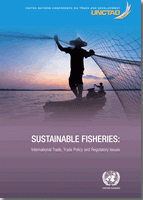Sustainable Fisheries: International Trade, Trade Policy and Regulatory Issues

The expiry of the United Nations Millennium Development Goals (MDGs) in 2015 and recent launch of the UN 2030 Agenda for Sustainable Development includes a specific goal (Goal 14) on conserving and sustainably using oceans, seas and marine resources.
The Sustainable Development Goals (SDGs) are accompanied by several management-related targets on fish. They denote the strong aspirations of the global community at the highest political level to prioritise and focus attention on restoring the health and resilience of our oceans and resources, including fish, over the next 15 years.
This accord presents a new opportunity, but also some challenges for the international community to mobilise actions. These actions must be considered within the myriad of fishing-related instruments, including fisheries partnership agreements and trade agreements, so as to concretely and significantly arrest the ‘tragedy of commons’ in fish today and instead transform the situation into a ‘triumph of commons’ for fish in the future.
In presenting the argument for this change, this note is structured as follows.
In Section 2, we review the relevance and importance of sustainable fisheries management.
In Section 3, we make reference to the new global agenda on oceans and fisheries, including the 2030 Agenda for Sustainable Development.
Further to outlining this overarching framework, in Section 4 we proceed to review market access (tariffs) and market entry regulatory (non-tariff) measures and certification on raw fish and processed fish products; this includes a review of World Trade Organization (WTO) negotiations under the Doha Round to liberalise fish trade and address harmful fish subsidies.
In Section 5, we review measures to address destructive fish practices especially illegal, unreported and unregulated fishing.
In Section 6, we refer to complementary fish management arrangements.
Finally, we conclude with a transformative agenda for future sustainable fisheries and how to turn the current tragedy of the commons into a triumph.


